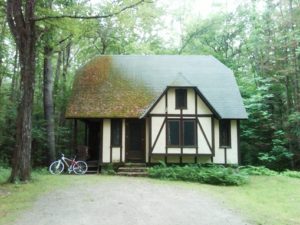 Mrs. T drove me up to Peterborough, New Hampshire, and dropped me off at the MacDowell Colony five years ago this past weekend. I spent the five weeks that followed working on Duke: A Life of Duke Ellington and Satchmo at the Waldorf. During that time I saw no shows and wrote no pieces for The Wall Street Journal or any other publication, though I did attend a memorable concert of music by colonists past and present. Otherwise I did nothing but write, stroll idly through the woods, eat the famously tasty meals provided by the staff, and get to know my fellow colonists, with two of whom I formed friendships that have lasted to this day.
Mrs. T drove me up to Peterborough, New Hampshire, and dropped me off at the MacDowell Colony five years ago this past weekend. I spent the five weeks that followed working on Duke: A Life of Duke Ellington and Satchmo at the Waldorf. During that time I saw no shows and wrote no pieces for The Wall Street Journal or any other publication, though I did attend a memorable concert of music by colonists past and present. Otherwise I did nothing but write, stroll idly through the woods, eat the famously tasty meals provided by the staff, and get to know my fellow colonists, with two of whom I formed friendships that have lasted to this day.
The studio in which I spent my mornings and afternoons, whose previous occupants include James Baldwin, Ruth Draper, and Spalding Gray, had no wi-fi, and I didn’t miss it after the first couple of days. I was overjoyed to be forced to pull the plug on the ceaseless hum and buzz of my everyday life, and concentrate instead on the work that had brought me there.
I arrived at MacDowell a bit more than a month after the death of my mother, an experience about which I had previously written a long posting. The colonists at MacDowell colonists are invited to “present” an example of their work during the stay, and I chose to read an excerpt from that piece, to which my listeners responded with sympathy and warmth. Not surprisingly, my mother was very much on my mind throughout my stay—but rarely during the day. Never before had I worked with such single-minded focus as I did at MacDowell, so much so that I was even able to put aside, if only for a time, my grief.
It was at MacDowell that I started to see myself for the first time not merely as a critic but as an artist as well. I wrote about this new self-understanding the day after I left:
Satchmo was premiered in Florida last fall, and a much-revised version of the play will soon be staged by two New England theater companies. Yet in spite of these undertakings, I continued to have difficulties seeing myself as anything other than a critic, a professional appreciator without creative powers of my own. Whenever I tried to tell people about the inexplicable thing that was happening to me, I felt obliged to resort to a grotesque metaphor. “It feels as if I’ve grown another arm,” I’d say.
Coming to the MacDowell Colony was a turning point in this process. Five weeks ago I withdrew from the world and drove to a secluded woodland retreat in New Hampshire, where I found myself in the company of some thirty-odd professional artists. I presented myself to them as a fellow artist and was accepted as one….My closest friends were a poet, a filmmaker, two installation artists, an avant-garde visual artist of ambiguous genre, and a dancer turned law professor. A couple of weeks ago I even acted (in a manner of speaking) in a reading of the first scene of an unfinished play by another colonist. My character, appropriately enough, was a failed actor d’un âge certain who had just written his first play.
Toward the end of my stay, I confessed my continuing uncertainties to one of my new friends. “I come from a small town, just like you, and for years I felt like it was a privilege to be an artist, like I didn’t really deserve it,” she told me. “That was how I was raised. Then I met a woman from Sweden who told me, ‘My dear, being an artist is your job.’ And I knew she was right.”
Five years later, Satchmo at the Waldorf has been produced off Broadway and throughout America. A year ago I made my professional debut as a stage director, and my second play, Billy and Me, will be premiered in West Palm Beach in December. Yes, I’m still a critic, and proud to be one—but I now know that I am also, beyond any possibility of doubt, an artist. I owe this miraculous transformation in part to my marriage to Mrs. T, who encouraged me to dig more out of myself than I had ever thought possible, and in part to the MacDowell Colony, which flung the door of possibility wider still and invited me to step through it. I bless the names of the men and women who saw fit to let me work there. They changed my life.
* * *
The New England Conservatory Contemporary Ensemble performs the original chamber version of Aaron Copland’s Appalachian Spring, composed in part at the MacDowell Colony:
